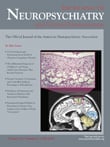Withdrawal Symptoms of Trifluoperazine
To the Editor : Trifluoperazine, a typical antipsychotic, has been frequently used in major psychotic disorders for many years. Sudden discontinuation of trifluoperazine is known to cause relapse of psychotic symptoms in patients suffering from major psychosis. 1 , 2 Trifluoperazine is not known to cause any distinct withdrawal symptoms like craving, dysphoria, irritability, restlessness, or insomnia. An extensive literature search revealed a prior report of trifluoperazine withdrawal symptoms like craving, irritability, dysphoria, and inability to work. 3 Below, we describe the development of nonpsychotic withdrawal symptoms in a patient after use of trifluoperazine for several years.
Case Report
A 78-year-old Indian man presented to us with a moderate depressive episode for 1 month. He had two previous episodes of depression which occurred 45 and 20 years ago, respectively. Both the episodes fully resolved with treatment, and the patient had no residual depressive symptoms in between the episodes. He also had severe nicotine dependence (smokeless tobacco) for about 56 years, from which he was abstinent for the previous year.
The patient was treated with antidepressants for his second episode of depression along with trifluoperazine, 2 mg/day. After 1 month, his depressive symptoms resolved completely, and he stopped taking the antidepressants. However, he continued taking trifluoperazine in the same dose for the next 20 years. He said that if he ever tried to stop this medicine he felt very weak, restless, dysphoric, and had difficulty getting to sleep. But there was never any depressive cognition, guilty feeling, or other characteristic depressive symptoms. On days when he could not take this medicine, he experienced a craving for it. He and his family members felt that this was not normal and he tried to reduce the dose to 1 mg/day. Such attempts failed when he developed the above-mentioned symptoms the next day, which forced him to restart trifluoperazine, 2 mg/day. Symptoms resolved immediately every time thereafter. At times he started taking 3 mg/day, but generally he maintained a dosage of 2 mg/day.
We treated the patient with escitalopram, 20 mg/day, for his depression and clonazepam, 1 mg/day, for associated sleep problems which developed during this depressive episode. With this he showed marked improvement in depressive symptoms. He was, however, still continuing trifluoperazine and was not motivated to stop it. When we asked him to try abstinence from trifluoperazine, he said he was unable to do away with it.
Discussion
Our patient fulfilled ICD-10 criteria of a possible trifluoperazine withdrawal syndrome. This is interesting because unlike all other dependence-producing substances, trifluoperazine is a dopamine blocking agent and is not expected to stimulate the mesolimbic/mesocortical dopaminergic reward circuit. So it might be due to a sensitive reward circuit in our patient, as evidenced by his severe nicotine dependence. Further research is needed to examine the possibility of a unique trifluoperazine withdrawal syndrome. As trifluoperazine is very commonly used in developing countries like India because of its low cost, such a finding may have important therapeutic implications.
1 . Morton MR: A study of the withdrawal of chlorpromazine or trifluoperazine in chronic schizophrenia. Am J Psychiatry 1968; 124:1585–1588Google Scholar
2 . Polizos P, Engelhardt DM, Hoffman SP, et al: Neurological consequences of psychotropic drug withdrawal in schizophrenic children. J Autism Dev Disord 1973; 3:247–253Google Scholar
3 . Basu D, Marudkar M, Khurana H: Abuse of neuroleptic drug by psychiatric patients. Indian J Med Sci 2000; 54:59–62Google Scholar



